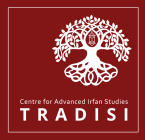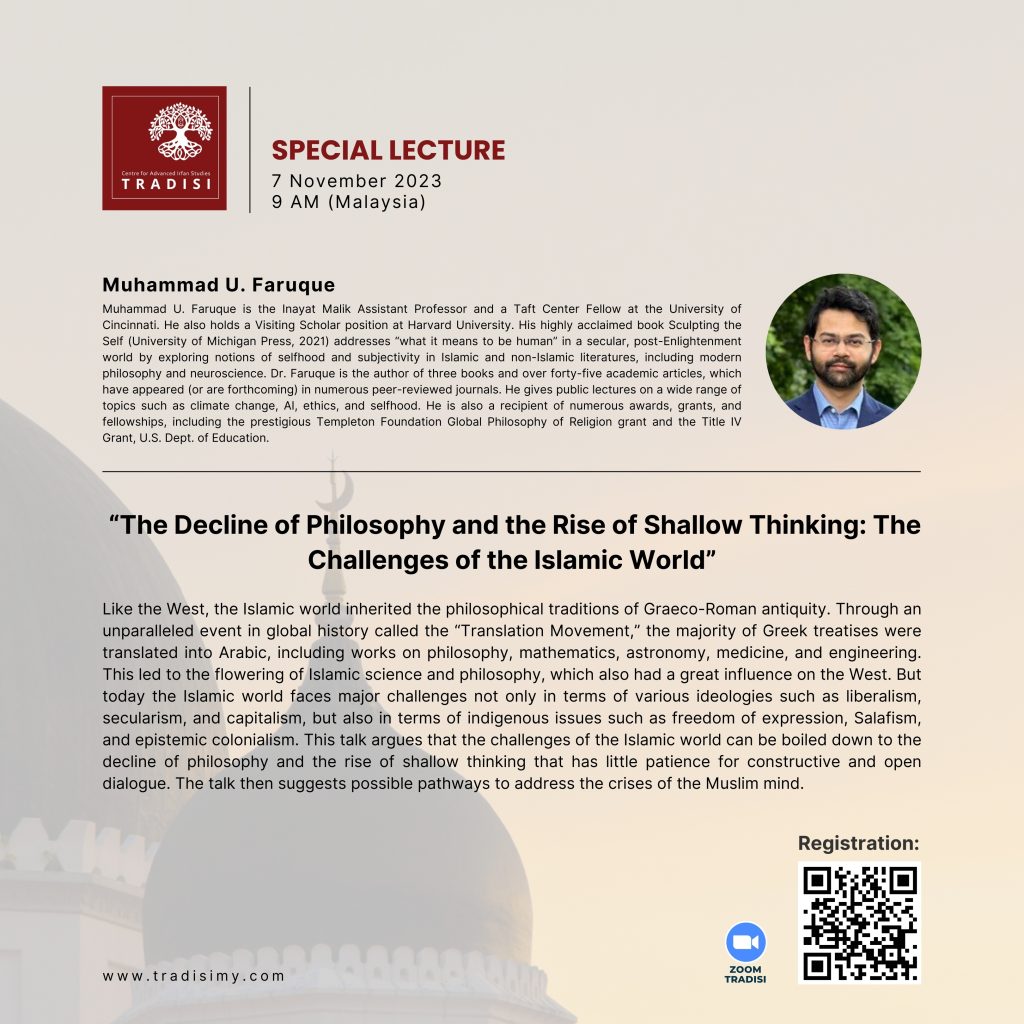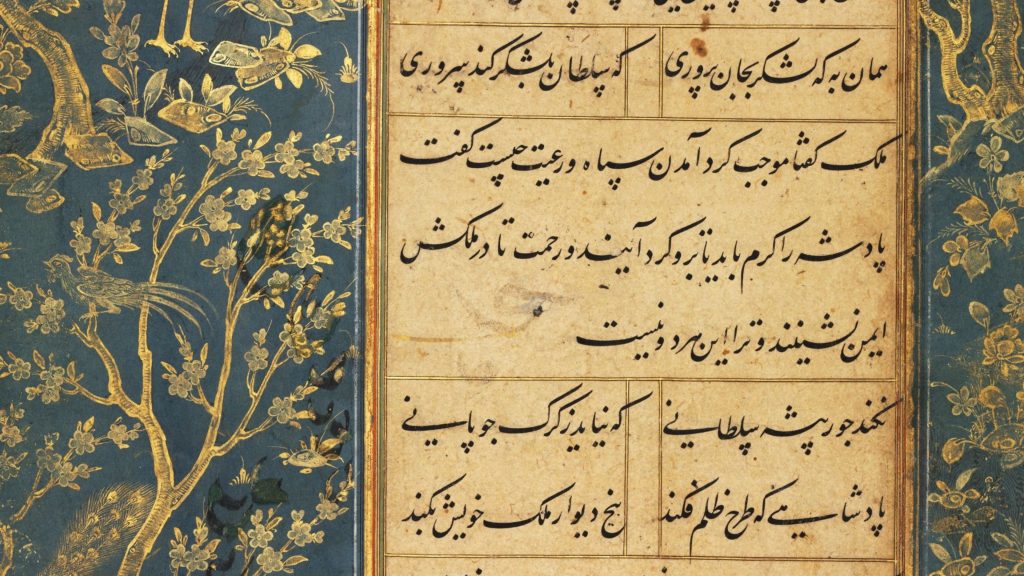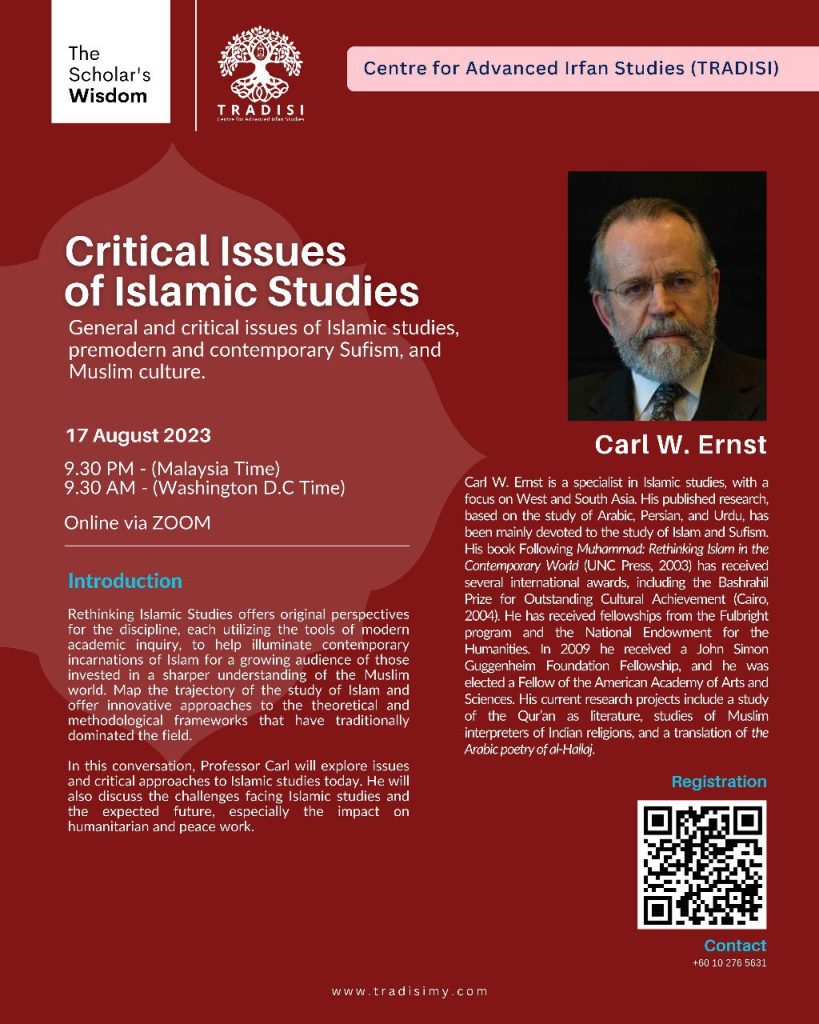News/Events As we turn the page to a new year, TRADISI is honored to present an enlightening educational offering that promises to illuminate hearts and minds. 2024 heralds our exclusive series of short courses centered on the profound realms of Islamic Philosophy and Sufism.
News
Special Lecture: “𝐓𝐡𝐞 𝐃𝐞𝐜𝐥𝐢𝐧𝐞 𝐨𝐟 𝐏𝐡𝐢𝐥𝐨𝐬𝐨𝐩𝐡𝐲 𝐚𝐧𝐝 𝐭𝐡𝐞 𝐑𝐢𝐬𝐞 𝐨𝐟 𝐒𝐡𝐚𝐥𝐥𝐨𝐰 𝐓𝐡𝐢𝐧𝐤𝐢𝐧𝐠: 𝐓𝐡𝐞 𝐂𝐡𝐚𝐥𝐥𝐞𝐧𝐠𝐞𝐬 𝐨𝐟 𝐭𝐡𝐞 𝐈𝐬𝐥𝐚𝐦𝐢𝐜 𝐖𝐨𝐫𝐥𝐝” Like the West, the Islamic world inherited the philosophical traditions of Graeco-Roman antiquity. Through an unparalleled event in global history called the “Translation Movement,” the majority of Greek treatises were translated into Arabic, including works on philosophy, mathematics, astronomy, medicine, and engineering. This led to the flowering of Islamic science and philosophy, Like the West, the Islamic world inherited the philosophical traditions of Graeco-Roman antiquity. Through an unparalleled event in global history called the “Translation Movement,” the majority of Greek treatises were translated into Arabic, including works on philosophy, mathematics, astronomy, medicine, and engineering. This led to the flowering of Islamic science and philosophy, which also had a great influence on the West. But today the Islamic world faces major challenges not only in terms of various ideologies such as liberalism, secularism, and capitalism, but also in terms of indigenous issues such as freedom of expression, Salafism, and epistemic colonialism. This talk argues that the challenges of the Islamic world can be boiled down to the decline of philosophy and the rise of shallow thinking that has little patience for constructive and open dialogue. The talk then suggests possible pathways to address the crises of the Muslim mind.also had a great influence on the West. But today the Islamic world faces major challenges not only in terms of various ideologies such as liberalism, secularism, and capitalism, but also in terms of indigenous issues such as freedom of expression, Salafism, and epistemic colonialism. This talk argues that the challenges of the Islamic world can be boiled down to the decline of philosophy and the rise of shallow thinking that has little patience for constructive and open dialogue. The talk then suggests possible pathways to address the crises of the Muslim mind.
Islamic Philosophy and Sufism
Tusi’s Mysticism: Texts and Analyses This section, first clarifies Tusi’s position in light of both conceptual categories of mysticism and comparative studies with works of other celebrated philosophers. Second, it focuses on the actual doctrine of Tusi in his major text on mysticism, AA, as well as in the mystical dimensions of his other works. Suhrawardi’s Educational Thought: Texts and Analyses Shihab al-Din Suhrawardi, a pivotal figure in Islamic intellectual history and the founder of the Illuminationist school of thought. Employing a blend of qualitative textual analysis and historical investigation, this research primarily focuses on Suhrawardi’s major works to extract and understand his views on knowledge, learning, and pedagogy. Islamic Philosophy and Mysticism This course is an introduction to contemporary visions and scholarship of Islamic philosophy and mysticism emphasis on major figures and themes. Topics covered include: (i) Iranian, Greek, and early theological background;(ii) Classical age of Islamic philosophy with an emphasis on ibn Sina’s philosophical system; (iii) the philosophy-religion-mysticism controversy; (iv) development of later Islamic philosophy in Iran with an emphasis on Tusi and Mulla Sadra; (v) basics of Rumi’s mysticism and brief remarks on mysticisms of ibn Arabi, Tusi, Shabestrari; Logic and Scientific Reasoning This course begins by clarification of different senses of ‘logic’ and logic as in context of theory of semiotics (syntax, semantics, and pragmatics), and the nature of artificial languages (signs and rules). Then the course studies different types of logical languages, sentential and predicate logic, including formal proofs of validity and invalidity of arguments. Next the discussion attends to the basics of scientific reasoning as well as sketches of advanced logic, such as set theory and philosophical issues such as problems of existence, truth, and intentionality. Reading (Texts, handouts, and on-line courses) Metaphysica Avicenna, P. Morewedge. Columbia University Press, 1970. Metaphysics of Tusi, tr. P. Morewedge. SUNY Oneonta, 1999. Parviz Morewedge, from Oxford Encyclopedia of Islam, ed. John Espoisto. Oxford University Press, 2009. “Islamic Theology,” “Illumination,” “ Jallal ad-Din Rumi,” “Mirdamad, ” “Mulla Sadra,” and “N. Tusi”; from Routledge Encyclopedia of Philosophy “the school of Qum”;from McMillan Encyclopedia of Philosophy, “Tusi”
Islamic Philosophy and Sufism Read More »
A Conversation with Carl W. Ernst
Critical Issues of Islamic Studies
General and critical issues of Islamic studies, premodern and contemporary Sufism, and Muslim culture
A Conversation with Carl W. Ernst Read More »
Special Lecture (ONLINE)
Speaker: Tahir Uluc Professor of Islamic Philosophy Necmeddin Erbakan University in Konya, Turkey. 5 August 2023, Saturday 9.00 PM (Malaysia) 4.00 PM (Turkey) Zoom: https://us06web.zoom.us/j/84751617580?pwd=MXZuVUNDcGc3ZnkzMG9mOXRETHRXZz09 Meeting ID: 847 5161 7580 Passcode: 439137 The relationship between philosophy and mysticism has been a topic of debate for centuries. Some scholars argue that they are two distinct paths to knowledge, while others argue that they are complementary approaches. This topic will explore from what epistemological point of view Suhrawardī finds the Peripatetic philosophy inadequate and on which principles he criticizes it. It will also present an in-depth analysis of how Suhrawardī, who considers himself a philosopher and his work to be philosophical, transforms the Peripatetic philosophy into an instrument and prelude that would serve the Illuminative philosophy.
Special Lecture (ONLINE) Read More »
Special Lecture: Avicenna’s Philosophy
Speaker: Peter Adamson Professor of Late Ancient and Arabic PhilosophyLudwig Maximilian University of MunichProfessor of ancient and medieval philosophyKing’s College London 14 JULY 2023, Friday4.00 PM (Malaysia)10.00 AM (Germany) Ibn Sīnā (Avicenna, d. 1037 CE) was the most influential philosopher of the classical period in Islam. His impact on philosophy in Europe is well known, and there is plenty of research on the use of Avicennan ideas in figures like Aquinas. What is less commonly appreciated is that Ibn Sīnā had a massive and long-running impact on philosophy in the Islamic East. This talk will focus on the initial stages of that tradition, discussing reactions to Ibn Sīnā’s ideas beginning around the time of al-Ghazāli (d. 1111) and following the story up through the end of the 13th century. Event Registration: https://docs.google.com/…/1FAIpQLSc…/viewform…
Special Lecture: Avicenna’s Philosophy Read More »
A Conversation with James Winston Morris
The ˹true˺ servants of the Most Compassionate are those who walk on the earth humbly, and when the foolish address them ˹improperly˺, they only respond with peace. (25:63) Date:July 20 (9 PM) Title:Spiritual Understanding and“Servants of the Most Merciful”:Sufism and Peace. A Conversation with James Winston Morris Join us for a conversation with James Winston Morris, a leading scholar of Sufism and Islamic philosophy. Professor James W. Morris has been studying Sufism for over 50 years, and he has a unique perspective on the role of Sufism in promoting peace and understanding in the world.In this conversation, Professor James W. Morris will explore the ways in which Sufism can help us to overcome conflict and violence, and to build bridges of understanding between different cultures and religions. He will also discuss the challenges that Sufism faces in the modern world, and how we can support the work of Sufis who are working for peace.During the conversation, there will be opportunities for audience participation. Audience members will be able to ask questions of Professor Morris, and they will also be able to share their own experiences with Sufism and peace.Event Registration: https://docs.google.com/…/1FAIpQLScdpkYEif…/viewform…
A Conversation with James Winston Morris Read More »
Special Lecture
SCHEDULE OF SPECIAL LECTURE(S) By the grace of Allah, Centre for Advanced Irfan Studies (Tradisi) will conduct online special lectures throughout 2023 on Islamic philosophy, theology, and tasawwuf. These lectures are open for public participation. Everyone is invited to join these events. Eric Winkel Alexander Knysh Mehdi Aminrazavi Peter Adamson Tahir Uluc Cyrus Ali Zargar Munjed M. Murad Muhammad U. Faruque Mohammed Rustom William C. Chittick



